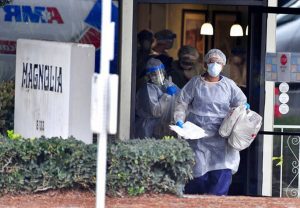 One of the great tragedies of the coronavirus pandemic is the disparate impact it has had on some of our most vulnerable citizens including elderly patients residing in Southern California nursing homes. Thousands of elderly nursing home residents across the country have died from coronavirus. Indeed, one of the first coronavirus outbreaks occurred in a nursing home in Kirkland, Washington where 129 residents, staff, and visitors fell ill with covid-19 and 40 died. In an unexpected twist of logic, many nursing homes are discharging long-term residents to care for patients with coronavirus. Why? Money, of course, even though this presents an increased risk to other residents of nursing homes and to their staff.
One of the great tragedies of the coronavirus pandemic is the disparate impact it has had on some of our most vulnerable citizens including elderly patients residing in Southern California nursing homes. Thousands of elderly nursing home residents across the country have died from coronavirus. Indeed, one of the first coronavirus outbreaks occurred in a nursing home in Kirkland, Washington where 129 residents, staff, and visitors fell ill with covid-19 and 40 died. In an unexpected twist of logic, many nursing homes are discharging long-term residents to care for patients with coronavirus. Why? Money, of course, even though this presents an increased risk to other residents of nursing homes and to their staff.
Caring for a patient sick with Covid-19 earns a Los Angeles nursing home, for example, significantly more money than can be charged for a non-Covid-19 patient who needs assistance with long term more mild conditions. In the fall of 2019, Medicare funding changed offering increased payments to nursing homes caring for patients who have recently been discharged from the hospital. The first weeks after their discharge, nursing homes earn up to four times of the daily amount offered for a long-term resident. For example, a nursing home can earn $800 per day for a COVID-19 patient while earning only $200 per day for a patient with dementia.
Thus, nursing homes have great incentive to attract those patients recently released from hospitals who are severely ill and require skilled nursing. To have the space to care for those patients, nursing homes must free up beds in their facilities. How does that happen? The long-term, less valuable patients are discharged, often under conditions that imperil their health and safety. Families of the soon to be discharged patients are called and told their loved one will be discharged sometimes in as few as 10 days, leaving no time to plan for or to find appropriate alternative housing for the patient. Little consideration is given to a patient’s level of income or to their well-being. Instead, the nursing homes while turning their backs on their vulnerable long-term residents tout their care of Covid-19 patients as a public benefit.
Meanwhile, caring for patients’ sick with coronavirus is no easy task. COVID-19 patients need to be quarantined to protect those who have not been exposed to the virus. Acute care hospitals are desperate to release those patients who are no longer ill enough to require hospitalization but are too ill to care for themselves at home. Nursing homes can fill that gap. There is a movement in public health departments to create COVID-19 positive nursing homes. From a business perspective, it’s a win-win for the nursing home. You replace your lowest paying residents with the highest paying residents.
Inevitably, there will be challenges. For example, health departments would like to find a larger chain of nursing homes to open COVID-19 treatment facilities so the pool of nursing staff will be deep enough to handle the inevitable absenteeism resulting when staff members fall ill with coronavirus. Health departments are consulting with nursing homes on how to properly care for COVID-19 patients.
This can come as a surprise to loved ones of long-term patients residing in nursing homes. In fact, some are not being informed that the nursing home where their loved one resides is caring for COVID-19 patients. This is particularly concerning where loved ones observe that the care provided is deficient even without the threat of potential outbreak of coronavirus.
To discuss a case of nursing home negligence call the Southern California Nursing Home Law Group at (866) 607-1325.
 Southern California Nursing Home Abuse Lawyer Blog
Southern California Nursing Home Abuse Lawyer Blog








